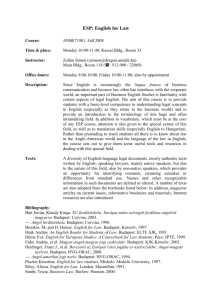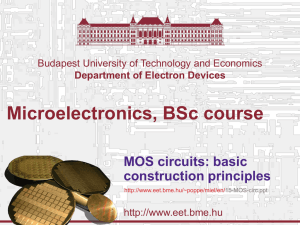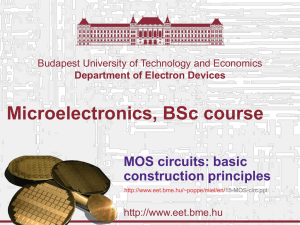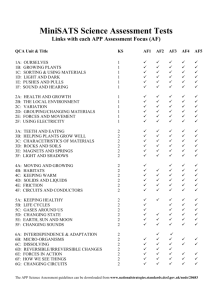16-ICdesign1
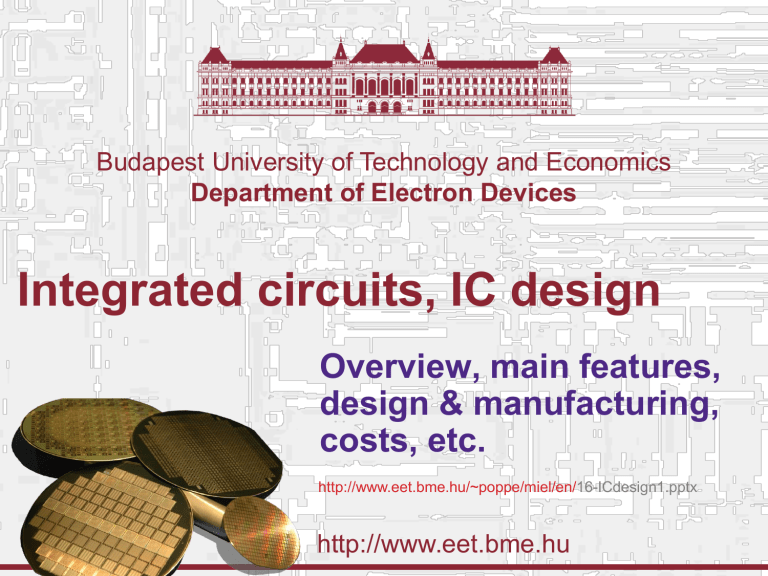
Budapest University of Technology and Economics
Department of Electron Devices
Integrated circuits, IC design
Overview, main features, design & manufacturing, costs, etc.
http://www.eet.bme.hu/~poppe/miel/en/ 16-ICdesign1.pptx
http://www.eet.bme.hu
Budapest University of Technology and Economics
Department of Electron Devices
Once more about the development trends
► Moore's law and its manifestations
► Roadmap data
20-11-2014 Integrated circuits, IC design © András Poppe, BME-EET 2008-2014
2
Budapest University of Technology and Economics
Department of Electron Devices
Recap
► We've seen what building blocks are being used in today's digital ICs:
CMOS logic gates
• main features, construction
– logic model → circuit schematic
► We've seen the basic principles of IC manufacturing
planar process, photo lithography
► We've seen that the in-depths structure is determined by 2D shapes on the applied photomasks: layout
► We've seen that there was a direct path from the logic level circuit schematics to the layout
► Now we discuss some non technical aspects of
IC manufacturing
Integrated circuits, IC design © András Poppe, BME-EET 2008-2014 20-11-2014 3
Budapest University of Technology and Economics
Department of Electron Devices
Microelectronics: fastest growing industry
Moore's law
► In 1965 Gordon Moore predicted that in every 14..18 months the number of transistors integrated in a chip will double
(exponential growth)
► This prediction is valid even today.
► The 1 million transistors/chip threshold was reached in the
1980-ies
2300 transistors, 1 MHz clock frequency (Intel 4040) - 1971
16 millió transistors (Ultra Sparc III)
42 millió transistors, 2 GHz clock frequency (Intel P4) - 2001
140 millió transistors, (HP PA-8500)
► More than Moore : further increase of integration density, e.g.
3D stacking of chips (RAM-s, pen drives)
Integrated circuits, IC design © András Poppe, BME-EET 2008-2014 20-11-2014 4
Budapest University of Technology and Economics
Department of Electron Devices
Technology trends: SIA roadmap
► Leading industrial experts provide continousely updated forecasts about the development trends microelectronics
(manufacturing processes and technologies)
Year 1999 2002 2005 2008 2011 2014
Feature size (nm)
Mtrans/cm 2
Chip size (mm 2 )
Signal pins/chip
Clock rate (MHz)
Wiring levels
Power supply (V)
High-perf power (W)
Battery power (W)
180
7
130
14-26
100
47
70 50 35
115 284 701
170 170-214 235 269 308 354
768 1024 1024 1280 1408 1472
600
6-7
1.8
90
1.4
800
7-8
1.5
130
2.0
1100
8-9
1.2
1400
9
0.9
1800
9-10
0.6
2200
10
0.6
160 170 174 183
2.4
2.0
2.2
2.4
NTRS = National Technolgy Roadmap for Semiconductors
SIA = Semiconductor Industry Association http://www.itrs.net/ntrs/publntrs.nsf
Node years: 2007/65nm, 2010/45nm, 2013/33nm, 2016/23nm
20-11-2014 Integrated circuits, IC design © András Poppe, BME-EET 2008-2014
5
Budapest University of Technology and Economics
Department of Electron Devices
Forecasts for the minimal feature size (MFS)
20-11-2014 Integrated circuits, IC design © András Poppe, BME-EET 2008-2014
6
Budapest University of Technology and Economics
Department of Electron Devices
Supply voltage, threshold voltage and oxide thickness trends
► Physical limits approached
Decrease of supply voltage , threshold voltage and oxide thickness with the decrease of the channel length
20-11-2014 Integrated circuits, IC design © András Poppe, BME-EET 2008-2014
7
Budapest University of Technology and Economics
Department of Electron Devices
Increase of design productivity
► Increase of design productivity is behind increase of circuit complexity:
10,000 100,000
1,000
Logic Tr./Chip
Tr./Staff Month.
10,000
100 1,000
10
58%/Yr. compounded
Complexity growth rate
100
1 10 x
0.1
x
1 x x x x x x
21%/Yr. compound
Productivity growth rate
0.01
0.1
0.01
0.001
20-11-2014 Integrated circuits, IC design © András Poppe, BME-EET 2008-2014
8
Budapest University of Technology and Economics
Department of Electron Devices
Some global issues of
IC design and manufacturing
► Increasing complexity / increasing costs
► Gap between complexity and design capacity
► Design and manufacturing separated
► Cost reduction
20-11-2014 Integrated circuits, IC design © András Poppe, BME-EET 2008-2014
9
Budapest University of Technology and Economics
Department of Electron Devices
Challenges in Digital Design
► Microscopic Problems
Ultra-high speed design
Interconnect
Noise, Crosstalk
Reliability,
Manufacturability
Power Dissipation
Clock distribution
► Macroscopic Issues
time-to-market
design complexity (millions of logic gates)
high abstraction level, testing
reusability, IP, portability
systems on a chip (SoC)
tool interoperability
YEAR
1997
1998
1999
2002
20-11-2014
Tech.
(MFS, μm)
0.35
0.25
0.18
Complexity
13 M Tr.
20 M Tr.
32 M Tr.
Clock frequency
400 MHz
500 MHz
600 MHz
0.13
130 M Tr.
800 MHz
Integrated circuits, IC design © András Poppe, BME-EET 2008-2014
Design effort in person years
210
270
360
800
Design cost
$90 M
$120 M
$160 M
$360 M
10
Budapest University of Technology and Economics
Department of Electron Devices
Global characteristics of a design
► Functionality
► Costs
One-time, fix costs or non-recurring engineering costs ( NRE ) – e.g. labor cost of design
proportional costs ( RE ) – materials, packaging, testing
► Reliability, robustness
noise margins
noise immunity
► Performance
speed (delays)
dissipation (energy consumption)
► Time-to-market
20-11-2014 Integrated circuits, IC design © András Poppe, BME-EET 2008-2014
11
Budapest University of Technology and Economics
Department of Electron Devices
Manufacturing costs of ICs
► One-time, fix costs or non-recurring engineering costs (NRE)
Costs of the design
• personal effort / labor cost of design work, CAD framework license fee
• labor costs of design verification
• mask manufacturing cost
Determined by the design complexity and design productivity
More significant in case of smaller production volumes
► Recurring engineering costs
costs of silicon processing
• proportional to the chip area
assembly costs (bonding, packaging)
testing
Plus amortization costs of the foundry cost per IC = proprtional costs per IC + fix cost volume
20-11-2014 Integrated circuits, IC design © András Poppe, BME-EET 2008-2014
12
Budapest University of Technology and Economics
Department of Electron Devices
Manufacturing costs of ICs
► Increasing NREs
20-11-2014 Integrated circuits, IC design © András Poppe, BME-EET 2008-2014
13
Budapest University of Technology and Economics
Department of Electron Devices
Cost per Transistor
cost:
¢-per-transistor
1
0.1
0.01
0.001
Fabrication capital cost per transistor (Moore’s law)
0.0001
0.00001
0.000001
0.0000001
1982 1985 1988 1991 1994 1997 2000 2003 2006 2009 2012
20-11-2014 Integrated circuits, IC design © András Poppe, BME-EET 2008-2014
14
Budapest University of Technology and Economics
Department of Electron Devices
Proportional costs
IC chip or die
(AMD Athlon processors)
Si szelet ( wafer )
►
Going up to 12” (30cm)
Influenced by
wafer size, die size
yield: # of functional / # of manufactured ICs
testing
• in-line, before packaging
• final testing (after packaging)
assembly costs
Dies per wafer
wafer diameter/2
2 die area
wafer diameter
2
die area
Integrated circuits, IC design © András Poppe, BME-EET 2008-2014 20-11-2014 15
Budapest University of Technology and Economics
Department of Electron Devices
Proportional costs (volume related)
die yield
1
defects per unit
area
die area
is approximately 3
Yield
No.
of good chips per wafer
Total number of chips per wafer
100 % cost of a good die = costs of a wafer volume × yield die cost + die testing cost + assembly cost volume related cost =
20-11-2014 yield of final testing
Integrated circuits, IC design © András Poppe, BME-EET 2008-2014
16
Budapest University of Technology and Economics
Department of Electron Devices
Numerical example for the yield
► Example
wafer diameter 12", die size 2.5 cm 2 , 1 defect/cm 2 ,
= 3 (is a measure of process complezity)
252 dice/wafer(rounded wafer, rectangular dice!)
die yield: 16%
252 x 16% = only 40 dice / wafer !
► Cost of a die is a strong function of die size (area)
proportional to the 3 rd or 4 th power of the size
20-11-2014 Integrated circuits, IC design © András Poppe, BME-EET 2008-2014
17
Budapest University of Technology and Economics
Department of Electron Devices
Examples for chip cost price
Chip
386DX
486DX2
PowerPC
601
HP PA
7100
DEC Alpha
Super
SPARC
Pentium
Interconnect layers
2
3
4
3
3
3
3
MFS Wafer cost defects
/ cm 2
0.90
$900 1.0
0.80
$1200 1.0
0.80
$1700 1.3
Area
(mm 2 )
43
81
121
0.80
0.70
0.70
0.80
$1300
$1500
$1700
$1500
1.0
1.2
1.6
1.5
196
234
256
296 chip
/ wafer
360
181
115 yield Chip cost
71%
54%
28%
$4
$12
$53
66
53
48
40
27%
19%
13%
9%
$73
$149
$272
$417
20-11-2014 Integrated circuits, IC design © András Poppe, BME-EET 2008-2014
18
Budapest University of Technology and Economics
Department of Electron Devices
Increase of design productivity
► Increase of design productivity is behind increase of circuit complexity:
10,000 100,000
1,000
Logic Tr./Chip
Tr./Staff Month.
10,000
100 1,000
10
58%/Yr. compounded
Complexity growth rate
100
1 10
0.1
x x x x
Possible solutions:
21%/Yr. compound
1 x x x
1.
x
Productivity growth rate
DESIGN ON HIGHER ABSTRACTION LEVEL
2.
AUTOMATED PHYSICAL DESIGN (SYNTHESIS)
0.001
0.01
20-11-2014 Integrated circuits, IC design © András Poppe, BME-EET 2008-2014
19
Budapest University of Technology and Economics
Department of Electron Devices
Manufacturing and design
Vertical structure: from the manufacturing process
Horizontal structure: from the design
These are separated in space and time
The link between the design and manufacturing is established by the design rules.
This applies to the (lateral) geometry of the devices.
Regarding the operation of the active devices the link between the technology and design is realized by the model parameters which are used in computer simulation (e.g. SPICE simulations).
Integrated circuits, IC design © András Poppe, BME-EET 2008-2014 20-11-2014 20
Budapest University of Technology and Economics
Department of Electron Devices
Manufacturing and design
► Manufacturing plants (fabs) are more and more expensive
Order of magnitude of billion US $ (huge CapEx costs)
Less and less advanced fabs world-wide
► Using the processes is getting also more expensive
Due to costs of masks, NRE (non-recurring engineering cost) of the advanced IC-s is increasing
► Few fabs – many designers
waferless fab – e.g. Silicon Labs, Duolog
Design and manufcaturing are strictly separated, but for proper design one has to be aware of the basics of the manufacturing processes and the physical operation of the devices.
20-11-2014 Integrated circuits, IC design © András Poppe, BME-EET 2008-2014
21
Budapest University of Technology and Economics
Department of Electron Devices
Ways of reducing costs
► Pre-design
Example: standard cell design (see details later)
Essentially: We work with pre-design circuit elements
(both in terms of schematics and layout).
► Pre-fabrication (see also pre-fab buildings)
Extreme example of the pre-fab principle for digital circuits: FPGA (Altera, Xilinx)
FPGA = field programmable gate array
It’s a matrix of logic gates with user programmable interconnections
Includes everything which is needed for a digital circuit. The NRE of manufacturing is distributed over among a huge number of manufactured IC-s. Costs of individual circuit design are only the cost of preparing a HDL description of the circuit.
Most popular realization technique today.
Integrated circuits, IC design © András Poppe, BME-EET 2008-2014 20-11-2014 22
Budapest University of Technology and Economics
Department of Electron Devices
Ways of reducing costs
► MPW – multi-project wafer
One wafer – joint manufacturing of multiple designs: tipycally 10-20 designs on the same wafer
Individual design
Individual fabrication
costs (NRE-s): 10-20 fold reduction per design
prototyping / small volume production
See details later
20-11-2014 Integrated circuits, IC design © András Poppe, BME-EET 2008-2014
23
Budapest University of Technology and Economics
Department of Electron Devices
Overview of IC design
EDA framworks
► Abstraction levels
►
►
Typical tools
Design using HDL – see the lab sessions
20-11-2014 Integrated circuits, IC design © András Poppe, BME-EET 2008-2014
24
Budapest University of Technology and Economics
Department of Electron Devices
CAD tools in VLSI design
Simulator: Representation: Abstraction level
System simulator
Behavioral description
Specification in VHDL or in Verilog
System level design
Synthesis
Logic simulation Structural description
Logic level design
Schematic editor
Layout generation
Timing parameters
Circuit simulator
Device parameters
Layout description
Transistor level design
Layout editor
Design rules
Process simulation
Ordinary designers do not use such tools.
20-11-2014 25
Budapest University of Technology and Economics
Department of Electron Devices
CAD tools in VLSI design
►
►
►
►
Circuit entry
Textual: using hardware description languages or HDLs (e.g.: Verilog,
VHDL)
• behavioral description (Verilog, VHDL, SystemC)
• structural description (Verilog, VHDL)
Graphical: schematic entry (structural description)
Simulation (on all abstraction levels)
system level, gate level logic, transistor/circuit
results visualization tools
tools for conceptual design, physical design verification tools
High level synthesis: behavioral → RTL → structural
Layout synthesis
On all abstraction levels a given representations of the design – data bases
20-11-2014 Integrated circuits, IC design © András Poppe, BME-EET 2008-2014
26
Budapest University of Technology and Economics
Department of Electron Devices
CAD tools in VLSI design
20-11-2014 Integrated circuits, IC design © András Poppe, BME-EET 2008-2014
27
Budapest University of Technology and Economics
Department of Electron Devices
CAD tools in VLSI design
20-11-2014 Integrated circuits, IC design © András Poppe, BME-EET 2008-2014
28
Budapest University of Technology and Economics
Department of Electron Devices
Circuit entry using an HDL
► Formerly: different in-house HDLs
exchange / re-use of designs
standards were needed
VHDL(Very high speed IC Hardware Description Language) : defined by the US DoD (Department of Defence); became the IEEE standard
► Suitable to describe all kinds of electronics systems realized by all kinds of technology
► Abstraction levels where VHDL can be used
Behavioral : for the description of the algorithm
Register Transfer Level, RTL : for the description of the data flow
Structural : logic gate level description
20-11-2014 Integrated circuits, IC design © András Poppe, BME-EET 2008-2014
29
Budapest University of Technology and Economics
Department of Electron Devices
Main features of VHDL
► Technology independent description
► Generic language: on structural level description is independent of the characteristics of the assumed elementary building blocks
► Human readable, relatively easy to read
► entity and architecture blocks
entity: declaration of the name, inputs and outputs and further parameters of the building block
architecture: description of the operation and some actual physical parameters
• within this: the "instructions" between the begin & end keywords are "executed" at the same time (hardware!)
Integrated circuits, IC design © András Poppe, BME-EET 2008-2014 20-11-2014 30
Budapest University of Technology and Economics
Department of Electron Devices
Verilog, SystemC
► Verilog : an HDL originating from the C language
"The" language in the CADENCE design environment
Simple, easy to read, most EDA environments can handle
► SYSTEM C: a new HDL based on C++
the usual language of hardware-software co-design
in fact collection of appropriate C++ classes
Synthesis options e.g:
1. SystemC
Verilog converter
2. Verilog
VHDL converter
3. VHDL based synthesis tool
20-11-2014 Integrated circuits, IC design © András Poppe, BME-EET 2008-2014
31
Budapest University of Technology and Economics
Department of Electron Devices
Simple example
VHDL
Verilog
20-11-2014
Using Verilog is dealt with in the lab
Integrated circuits, IC design © András Poppe, BME-EET 2008-2014
32
Budapest University of Technology and Economics
Department of Electron Devices
Hardware design with HDL
► Like computer programming
► BUT: the result will be a real hardware
E.g. a for (i=0, i<n, i++) like loop means, that the building blocks referred to in the core of the loop must be
"placed" (or instanced) n-times, e.g. connection to an n-bit bus
Discussed during lab
► not know yet what will be the final realization technology.
► The result of technology mapping could be:
netlist of a full custom IC (base of layout synthesis)
FPGA (generating a code to be downloaded int an FPGA)
33
Budapest University of Technology and Economics
Department of Electron Devices
Some professional IC design tools
► Mentor Graphics:
• some of Mentor's tools are used in the lab
► Cadence:
• Using this suite we demonstrate a complete IC designflow
► Usual platforms (Linux, Windows)
Integrated circuits, IC design © András Poppe, BME-EET 2008-2014 20-11-2014 34
Budapest University of Technology and Economics
Department of Electron Devices
E.g.: MPW design & manufacturing
► Players:
silicon foundry (e.g. ST, AMS, NXP, ...)
EDA vendor (pl. Cadence, Mentor, ...)
Packaging house
MPW service provider silicon broker (pl. EUROPRACTICE, CMP,
MOSIS)
end-user who is also the designer is (like us)
► MPW manufacturing = M ultiP roject W afer
1 Si wafer: 10-15 chips,
manufacturing runs: every 2-3 months (3-4-5 times a year)
turnaround: from layout submission to packaged chip: 2-3 months
sharing the costs (NREs), costs proportional to Si-area
E.g.:
250 EUR/mm 2 , 4 mm 2
1000 EUR + 100 EUR packaging
5 packaged chips, 10 bare dice (66 EUR/chip)
typical use case: prototyping
small volume production : pl. 5-6 wafers with the same chip
Integrated circuits, IC design © András Poppe, BME-EET 2008-2014 20-11-2014 35
Budapest University of Technology and Economics
Department of Electron Devices
E.g.: MPW design & manufacturing
designer 1
MPW service provider designer 2
20-11-2014 Integrated circuits, IC design © András Poppe, BME-EET 2008-2014 designer 3
36
Budapest University of Technology and Economics
Department of Electron Devices
E.g.: MPW design & manufacturing
Si-foundry
Design rules, device parameters, standard cell library
Chip layouts united
Si wafer with 10-15
ICs
Packaging house
Bare chips
Packaged ICs
MPW service provider
CAD tool, design kit
Chip layout
Designer and end-user
CAD tool
EDA vendor
Packaged IC
20-11-2014 Integrated circuits, IC design © András Poppe, BME-EET 2008-2014
37
Budapest University of Technology and Economics
Department of Electron Devices
E.g.: MPW design & manufacturing
20-11-2014 Integrated circuits, IC design © András Poppe, BME-EET 2008-2014
38
